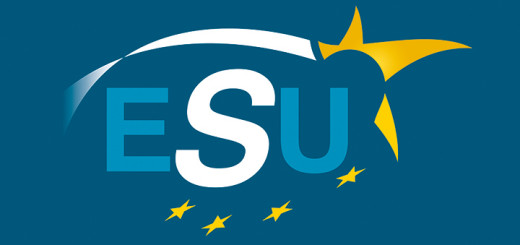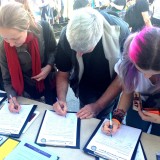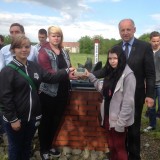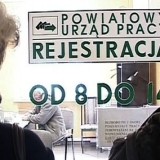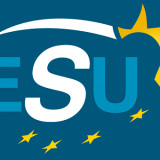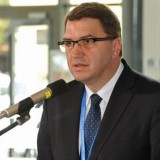Newsletter ESU 136
Dostępne tylko wersje w językach niemieckim i angielskim
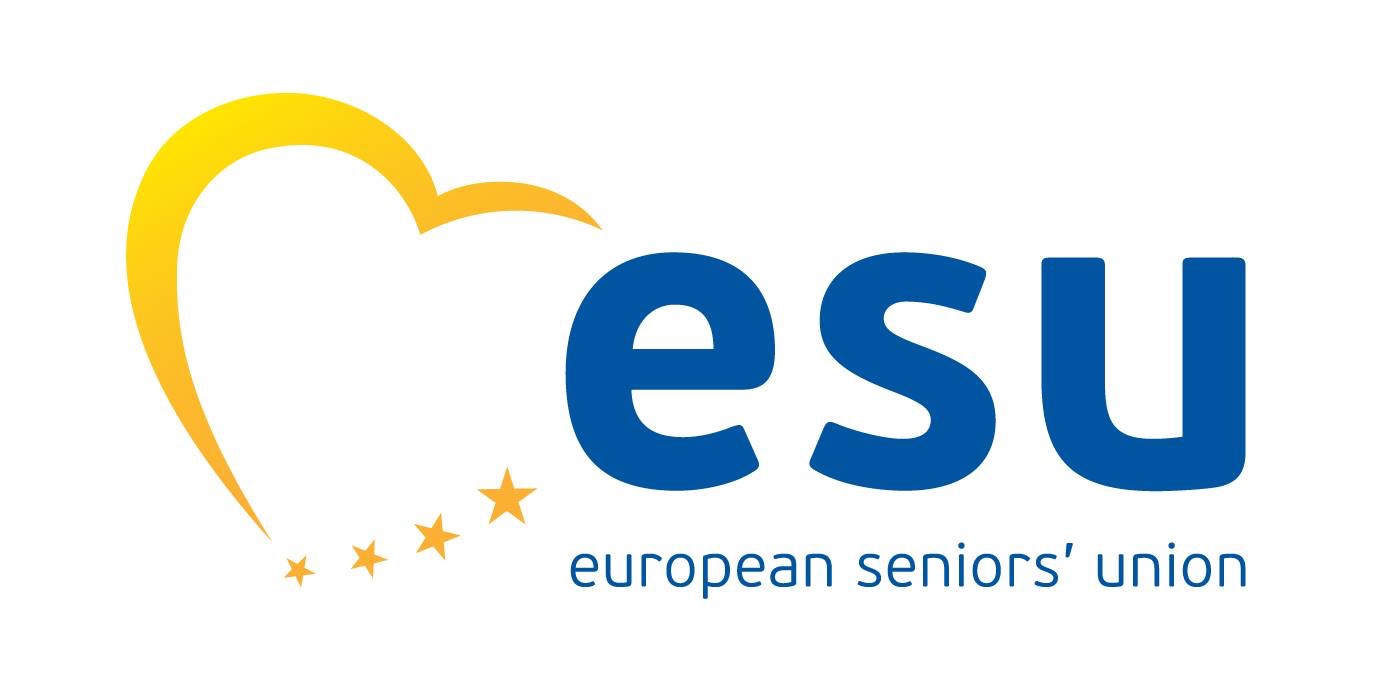
EUROPÄISCHE SENIOREN UNION (ESU)
Newsletter „SENIOR INTERNATIONAL“ Nr. 136 (deutsch) 13. Juli 2016
Gemeinsam EUROPAs Zukunft bauen!
Bericht über die 7. Sommerakademie in Wien
von Claus Bernhold
Auf Einladung der ESU kamen Anfang Juli 50 Führungskräfte von Seniorenorganisationen aus 22 Staaten in Wien zusammen. Das Thema der traditionellen „Sommerakademie“ lautete diesmal: Europa darf nicht sterben. Es war schon vor Monaten festgelegt und gewann nun durch die Entscheidung für den „Brexit“ zusätzliche Aktualität.
Bereits zum 7. Mal hat der Österreichische Seniorenbund (ÖSB) diese Konferenz ausgerichtet; dabei konnte er sich erneut der Unterstützung durch die Politische Akademie der ÖVP und das Wilfried Martens Centre for European Studies (WMCES) sicher sein.
Grußworte zum Auftakt sprachen: Dr. Werner Fasslabend, Ehrenpräsident der Politischen Akademie (PolAk); Tomi Huhtanen, Direktor des WMCES und die Präsidentin des ÖSB, Ingrid Korosec. Das Wort nahm auch Dr. Marilies Flemming, die Europabeauftragte des ÖSB, der die Organisation der Sommerakademien in Wien von Beginn an zu danken ist. Prof. Dr. An Hermans, Präsidentin der Europäischen Senioren Union, präsentierte im ersten Teil der Beratungen in einem Video wesentliche Arbeitsergebnisse der ESU.
Die Konferenz war sich einig über die Verantwortung der europäischen Seniorinnen und Senioren für die Gemeinschaft. Mit ihrer Erfahrung müssten sie dazu beitragen, die Zukunft des Kontinents zu gestalten, wurde mehrfach betont. Eine auf dieser Entschlossenheit basierende und einmütig beschlossene Resolution von Wien haben wir in der Ausgabe N. 135 vom 4. Juli veröffentlicht.
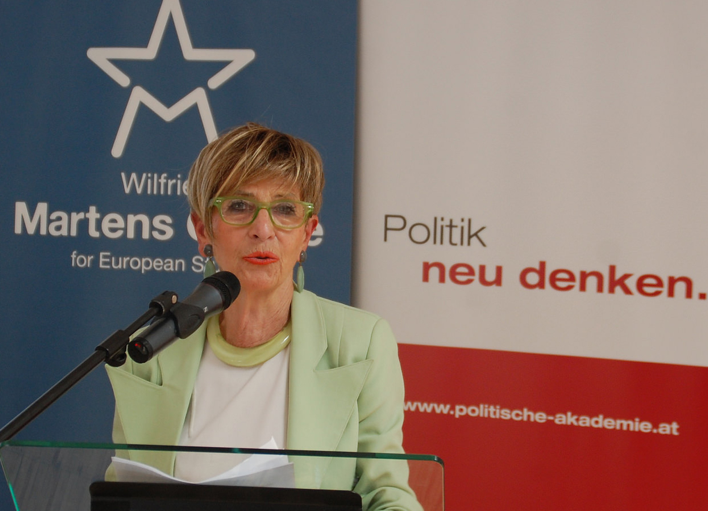
Die neue Bundesvorsitzende des Österreichischen Seniorenbundes
Ingrid Korosec während ihrer Ansprache
Ingrid Korosec, die neue Vorsitzende des gastgebenden Österreichischen Seniorenbundes, betonte das Motto der Tagung „Europa darf nicht scheitern” und hielt u.a. fest: In einer unglaublich populistischen Kampagne sei den Menschen in Großbritannien vorgemacht worden, es ginge ihnen ohne die EU besser und man werde mit dem Austritt hunderte Millionen Pfund pro Woche (!) einsparen und diese Summen in das britische Gesundheitssystem NHS stecken. Es sei nicht verwunderlich, dass gerade die Älteren den Schlachtrufen der Austritts-Befürworter mehrheitlich gefolgt sind. Schon am Tag nach der Abstimmung musste man aber erkennen: Dieses Versprechen existiert nicht mehr, es wurde als Fehler bezeichnet. Diesem Populismus müsse man sich in den Ländern entgegenstellen! „Den Brexit müssen wir als Chance zum Neustart der EU begreifen!“
Dr. Werner Fasslabend analysierte die konkreten Auswirkungen des Brexit: „Ich sehe hier eine „loose-loose-loose-loose-win“-Situation, also vier Verlierer und nur einen Gewinner. Zu den Verlierern zählt Großbritannien selbst, weil wir dort nun interne Konflikte mit Schottland und Irland sehen und weil wir eine Abkoppelung von den direkten Nachbarn feststellen müssen. Europa verliert seine zweitgrößte Volkswirtschaft aus dem Kreis der Mitglieder, was das Gewicht Europas in der Welt verringert. Die Gemeinschaft verliert ein kritisches Mitglied, das viele Entwicklungen und Entscheidungen durch seine Zustimmung möglich machte. Die Welt verliert, weil die Entwicklungen rund um den Brexit die weiterhin labile Weltwirtschaftslage mit Sicherheit nicht verbessern werden. Zu den Gewinnern aber gehören Putin und China, weil die Destabilisierung Europas, überhaupt der westlichen Welt, in deren Interesse ist.“
Zurück zu den europäischen Wurzeln! Föderalistisch, aber nicht zentralistisch und vor allem weniger technokratisch!, lautete kurzgefasst die Botschaft von Tomi Huhtanen. Er zeichnete Umbrüche in der Gesellschaft nach: „Seit 1840 ist die Lebenserwartung in jedem Jahr um drei Monate gestiegen. Ein heute geborenes Kind hat die 50prozentige Chance, über 100 Jahre alt zu werden. Das ist keine Fiktion, das ist Europa! Lebensbegleitendes Lernen wird daher zum Schlüsselpunkt für die erfolgreiche Zukunft Europas und seiner Bürgerinnen und Bürger. Die früher bekannten drei Lebensphasen (Anmerkung: Ausbildung / Arbeitsleben / Pensionszeit) befinden sich in Auflösung; für die Zukunft erwarten wir vier, fünf oder sogar sechs Lebensphasen, die einander abwechseln, und damit völlig neue Karriereverläufe!“
Nach Analyse der aktuellen Entscheidungen rund um den Brexit hielt Huhtanen fest: „Um Europa weiterzuentwickeln, müssen wir zurück zu den Wurzeln, zum Gründungsgedanken der EU. Das europäische Narrativ wird heute nämlich nur noch als technokratisch wahrgenommen. Wir müssen stärker zusammenarbeiten.“ Und dies in dem anfangs zitierten Sinn.
Fazit: Das Ergebnis des britischen Referendums ist die Folge einer beispiellosen Desinformationskampagne. Die verbleibenden 27 Staaten haben jetzt zeitnah Entscheidungen zu treffen. Insbesondere die Flüchtlingsproblematik müsse gelöst werden, weil diese gerade die ältere Generation besonders beschäftigt.
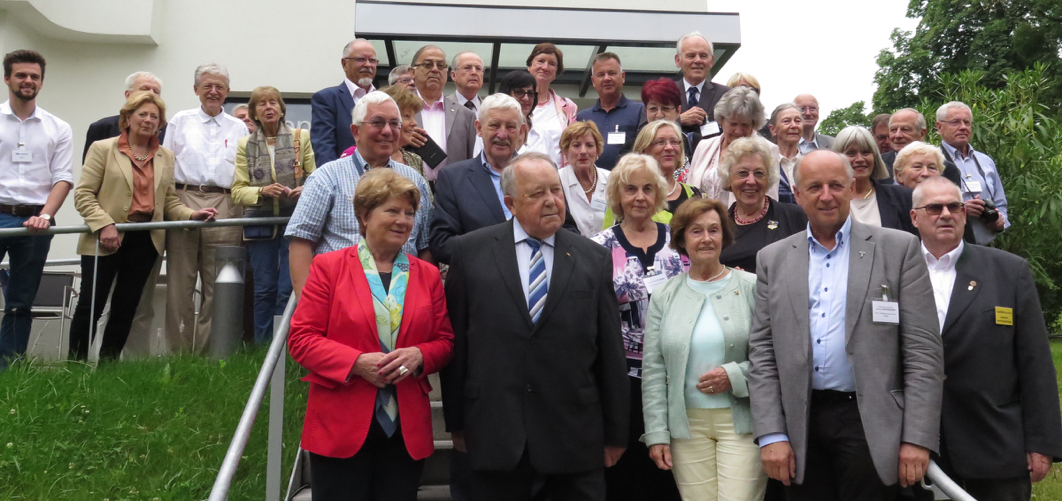
Blick auf Teilnehmer der 7. ESU-Sommerakademie in Wien
Prof. Dr. An Hermans, Präsidentin der ESU, fasste in ihrem Referat die Themen und Ergebnisse der vorangegangenen sechs Sommerakademien in Wien zusammen. Dabei betrachtete sie insbesondere die Relation der verschiedenen Generationen zueinander: „Wir haben im Vorjahr begonnen, Lebensgeschichten in Europa zu sammeln. So können wir Erfahrungen und Erlebtes der Älteren an die Jüngeren weitergeben, so können wir voneinander lernen. Mit dieser Arbeit wollen wir mögliche Gräben zwischen Jung und Alt überbrücken!“ Dazu präsentierte die ESU-Präsidentin ein Video, an deren Ende sie betont: „Wir wollen ein Europa, das die Menschen in den Mittelpunkt stellt. Ein Europa, das keinen Unterschied aufgrund von Geschlecht, Alter, Religionsbekenntnis oder Herkunft macht. Ein Europa, das in der Lage ist, sich in der sich stets ändernden Welt zu behaupten. Arbeiten wir gemeinsam daran!“
Ursachen und Ergebnis des britischen Referendums zum „Brexit” untersuchte Prof. Steven Van Hecke, Universität Leuven, in einem umfassenden Referat. Er verwies darauf, dass Premierminister Cameron zu Beginn des Jahres 2013 als Preis für die Unterstützung der Europaskeptiker bei den seinerzeit anstehenden Neuwahlen die Volksabstimmung über die EU-Mitgliedschaft versprochen hat.
Das Ergebnis der aktuellen Abstimmung stehe im Gegensatz zu der 1975 abgehaltenen, bei der Margret Thatcher das Lager der Befürworter anführte.
Die Untersuchungen einzelner Ergebnisse zeigten, dass Großbritannien insgesamt gespalten ist, was Zustimmung bzw. Ablehnung betrifft, betonte Van Hecke.
„Wer denkt, will bleiben“ könnte eine Überschrift lauten, denn offenbar haben höher gebildete Teile der Bevölkerung eindeutig für den Verbleib in der EU gestimmt.
Mit zunehmendem Lebensalter seien Wahlbeteiligung und Ablehnung gestiegen.
Zusätzlich seien weitere Divergenzen zu beobachten: Geographische und zwischen Labor und Tories.
Die Anwendung des Art. 50 des Lissabon-Vertrages werde – so der Referent – für das Vereinigte Königreich weitreichende Folgen haben, die vor allem – aber nicht nur – auf den Gebieten der wirtschaftlichen und der Handelsbeziehungen liegen.
Von der Mehrheit der verbleibenden 27 EU – Mitgliedsstaaten werden weitere Zugeständnisse und Bevorzugungen für Großbritannien abgelehnt.
Ein zweites Referendum zur Korrektur des vorliegenden Ergebnisses hält van Hecke für unrealistisch – es sei denn, bei einer vorgezogenen Parlamentsneuwahl werden neue diesbezügliche Versprechungen gemacht. Auch nach der Europawahl 2019 sieht der Referent die EVP nach wie vor als stärkste Gruppierung im Europaparlament.
Auswirkungen und Folgen für die EU und Großbritannien waren Themen einer angeregten Diskussion. Unterschiedliche Auffassungen gab es z.B. zu Äußerungen von Kommissionspräsident Juncker zur Vollendung der Währungsunion oder zu CETA.
(Weiterer Konferenzbericht folgt.)
Großbritannien: Wechsel an der Regierungsspitze
Inzwischen hat der britische Premier David Cameron seinen Dienstsitz Downing Street No. 10 in London seiner Nachfolgerin Theresa May überlassen. Die bisherige Innenministerin im Kabinett Cameron war am 11. Juli zur Vorsitzenden der Konservativen Partei gewählt worden und kandidierte schließlich als Einzige für das Spitzenamt der Regierung. Königin Elisabeth II ernannte sie am 13. Juli als Premierministerin. Mrs. May hatte nicht für den Brexit gestimmt, werde jedoch nach eigenen Angaben an dem Votum festhalten und sich für ein starkes Vereinigtes Königreich einsetzen.
Die ESU hat derzeit keine Partnerorganisation in Großbritannien.
Östliche Partnerschaft: An Hermans begrüßt /Neue Gruppen
Zwei Seniorengruppen aus Aserbaidshan und eine aus Moldova haben sich der „Östlichen Partnerschaft“ /EaP angeschlossen. Sie wurden , wie Tatjana Zelko aus Minsk berichtete, auf der Tagung ihrer Unter-Arbeitsgruppe „Kontakt zwischen den Senioren“ Mitte Juni in Brüssel herzlich willkommen geheißen.
Als Referentin des zeitgleich tagenden „Civil Society Forum“ („Forum der Zivilgesellschaft“) der EaP bezeichnete es ESU- Präsidentin Prof. Dr. An Hermans dem Konferenzbulletin zufolge als Anliegen der Europäische Senioren Union, den Älteren und ihren Organisationen eine Stimme zu geben – sowohl auf sozialer als auch auf politischer Ebene. Die Bewahrung der Menschenrechte sei für Alt und Jung gleichermaßen wichtig. Prof. An Hermans forderte für die Senioren ein Leben in Würde und als aktiver Teil der Gesellschaft. Zwar sei die EU für die Altersbezüge nicht zuständig, wohl aber könnten anhaltende Gespräche mit den Regierungen Erfolge bringen.
Eine Diskussion über Erasmus+ sowie die Situation und Zukunft der EaP wurde von Hovsep Khurhdyan moderiert, dem Vorsitzenden des Armenischen Seniorenverbandes, der mit der ESU kooperiert. Er ist Koordinator der Gesamt-Arbeitsgruppe 4 „Kontakte zwischen den Bürgern“ des EaP-Civil Society Forums. Die Kooperation der EU mit den zur Östlichen Partnerschaft zählenden Ländern (Armenien, Aserbaidshan, Belarus, Georgien, Moldova, Ukraine) hält er für außerordentlich bedeutsam.
Georges Dassis: EU – „größte Errungenschaft des Jahrhunderts“
In einem Interview, das Dr. Victoria Znined für „EZA aktuell“ mit dem Griechen Georges Dassis (unser Bild), dem Vorsitzenden des Europäischen Wirtschafts- und Sozialausschusses, führte, machte dieser beachtenswerte Ausführungen. So habe „Europa“ eine ganze Reihe von Dingen „furchtbar schlecht gemacht“, weil es „an Mut, Weitblick und Solidarität fehlt“.
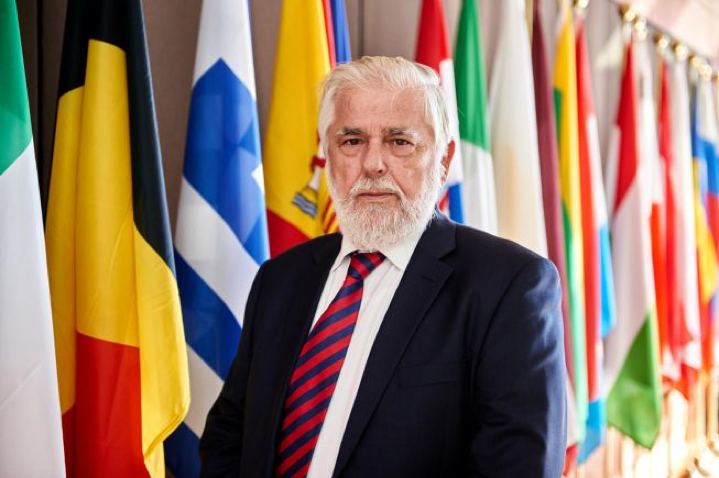
Dassis, seit 2015 in diesem Amt, sieht Defizite im wirtschaftlichen und sozialen Bereich, aber auch in der Außen-, Verteidigungs- und Europapolitik. Er bedauert, dass der Lissaboner Vertrag kein Schulstoff ist und bezweifelt, dass alle Politiker die wesentlichen Artikel 2 und 3 mit fünfmaliger Nennung des Begriffes „sozial“ gelesen haben. Die schnelle Umsetzung der sozialen Ziele würden helfen, dass „die Bürger wieder eine Verbindung zu dem Projekt (offenbar ist EUROPA gemeint) bekommen“. Die EU mag zwar nicht vollkommen sein, „aber sie ist die größte Errungenschaft der europäischen Bevölkerung während des 20. Jahrhunderts, und wir müssen natürlich weiter an ihrer Verbesserung arbeiten, denn ich sehe keine bessere Zukunft für unsere Kinder.“
EZA steht für „Europäisches Zentrum für Arbeitnehmerfragen“, das in der ESU Beobachterstatus hat. Generalsekretärin ist Sigrid Schraml. Kontaktdaten: www.eza.org; Mail:eza@eza.org, Tel.: +49 2223 – 2998 – 14.
Belarus: Vereint gegen Privatisierungsstopp
Sechs gesellschaftliche Organisationen haben gegen eine Regelung der Regierung protestiert, wonach die Privatisierung selbstgenutzter Wohnungen und Häuser ab 1. Juli gestoppt ist. Diese Maßnahme wird als antisozial bewertet. Lediglich für hohe Summen (mehrere tausend Euro) soll die Privatisierung gestattet werden, wodurch die Mehrheit der Interessenten von vornherein ausgeschlossen ist. Zu den Unterzeichnern des Appells
zählen neben der ESU-Partnerorganisation „Nasha Pakalenne/Unsere Generation“ Menschenrechts- und Kriegsveteranen- Organisationen sowie Gewerkschaftsvertreter.
EU/ Lettland: Roswitha Gottbehüt mit Doktorhut
Der langjährigen EZA – Generalsekretärin Roswitha Gottbehüt wurde die Ehrendoktorwürde der Lettischen Christlichen Akademie zuteil. Bei der feierlichen Zeremonie in Jurmala
würdigte Akademie-Direktorin Skaidrite Gutmane die seit 2004 gepflegten Kontakte und Kooperationen, die auf Anregung von Frau Dr. Gottbehüt zustande kamen und den sozialen Dialog beförderten.
________________________________________________________________________
Impressum
Redaktion: ulrich.winz@web.de
ESU: Rue de Commerce /Handelsstraat 10, 1000 Brussels; Tel. +32 23 09 28 66
Website: www.esu-epp.eu, E-Mail: esu@epp.eu; Twitter: esu_epp; Facebook:com/esu.eu
EUROPEAN SENIORS‘ UNION (ESU)
ESU – Newsletter “SENIOR INTERNATIONAL” No. 136 (English) 13th July 2016
Building Europe’s Future Together!
Report of the 7th Summer Academy in Vienna
by Claus Bernhold
At the invitation of the ESU, 50 leaders of seniors’ organizations from 22 countries came together in Vienna. The topic of the traditional “Summer Academy” this year was: “Europe must not die.” It already was decided several months ago, and now gained additional relevance because of the “Brexit” decision.
For the 7th time already, the Austrian Seniors’ Union (ÖSB) has hosted this conference; it could be certain of receiving support from the Political Academy of the ÖVP and the Wilfried Martens Centre for European Studies (WMCES) once again.
Opening greetings came from: Dr. Werner Fasslabend, Honorary President of the Political Academy (PolAk); Tomi Huhtanen, Director of WMCES and Ingrid Korosec, President of the ÖSB. Dr. Marilies Flemming, European Commissioner of the ÖSB, also spoke and is to be thanked for the organization of the Summer Academies in Vienna from the beginning. In the first part of the discussions, Prof. Dr. An Hermans, President of the European Seniors’ Union, presented a video of the essential outcomes of the ESU.
The conference was united about the responsibility of European seniors to the community. It was emphasised repeatedly that, with their experience, they ought to help to shape the future of the continent. We published the “Resolution of Vienna”, based on this determination and unanimously adopted, in issue No. 135 of 4th July.

The new Federal Chairman of the Austrian Seniors’, Ingrid Korosec,
during her speech
Ingrid Korosec, the new Chairman of the hosting Austrian Seniors’ Union, emphasised the topic of the conference “Europe must not fail” and stressed, among other things: in an incredibly populist campaign, people in the UK were deceived into thinking they would be better off without the EU, and with Brexit they would save hundreds of millions of pounds a week (!) and this money would be put into the British health system (NHS). It is no wonder that the majority of the elderly, in particular, followed the battle cries of the Leave supporters. Already on the day after the vote it had to be recognised: this promise does not exist any more, it was described as an error. This populism must be opposed in countries! “We have to consider Brexit as an opportunity to restart the EU!”
Dr. Werner Fasslabend analysed the actual impact of the Brexit: “I see a „lose-lose-lose-lose-win” situation, that is, four losers and only one winner. The UK is among the losers because we now see internal conflicts with Scotland and Ireland, and because we will have to recognise a decoupling of the direct neighbours. Europe will lose its second largest economy from among its members, which will decrease Europe’s weight in the world. The Community loses a critical member that has made many developments and decisions possible by its approval. The world loses, because the developments arising from Brexit do not improve further a fragile world economic situation with security. Putin and China belong to the winners, because the destabilization of Europe, and the Western world in general, is in their interest.”
“Return to European roots! Federalistic, but not centralised and above all less technocratic” was the concise message of Tomi Huhtanen. He portrayed upheavals in society: “Since 1840, life expectancy has increased by three months every year. A child born today has a 50 percent chance of being more than 100 years old. This is not fiction, this is Europe! Lifelong learning is therefore a key point for the successful future of Europe and its citizens. The previously known three stages of life (note: education / working life / retirement) is breaking down; in the future, we can expect four, five or even six life stages, alternating with each other, and thus completely new career directions!”
After analysing the current decisions around Brexit, Huhtanen noted: “In order to develop Europe further, we must go back to basics, to the founding principles of the EU. The European narrative today is perceived only as technocratic. We need to work harder together.” And this is what was meant initially.
In summary: the result of the British referendum is a consequence of an unprecedented disinformation campaign. The remaining 27 states have to make decisions soon. In particular, the refugee problem must be solved, because this preoccupies the older generation in particular.

Several participants of 7th ESU Summer Academy in Vienna
In her presentation the ESU President, Prof. Dr. An Hermans, summed up the topics and results of the previous six Summer Academies in Vienna. In this regard, she observed in particular the relationship of different generations to each other: “We started last year to collect life stories in Europe. Thus we can pass on experiences and the events we witnessed from the older to the younger ones and so we can learn from each other. With this work we want to bridge possible gaps between young and old!” With this, the ESU President presented a video that emphasised at the end: “we want a Europe that places people at the centre. A Europe that makes no distinction based on gender, age, religious belief or origin. A Europe that is able to maintain itself in a constantly changing world. Let us work on this together!”
In a comprehensive presentation, the causes and consequences of the British referendum on “Brexit” were examined by Prof. Steven Van Hecke, University of Leuven. He pointed out that Prime Minister Cameron had promised a referendum on EU membership at the beginning of 2013 as the price for the support of the Euro-sceptics in the then new elections.
The result of the current vote stands in contrast to that of 1975, when Margaret Thatcher led the supporters’ camp.
Investigations into individual results showed that the UK as a whole is divided as regards approval or rejection, stressed Van Hecke.
“Those who think, want to remain” could be a headline, because evidently the highly educated segments of the population have voted unambiguously to remain in the EU.
Both turnout and rejection rise with increasing age.
In addition, further divergences were observed: geographical, and between Labour and Tories.
The application of Article 50 of the Lisbon Treaty will – according to the speaker – have far-reaching consequences in the United Kingdom, especially – but not only – in the areas of economic and trade relations.
The majority of the remaining 27 EU-Member States have rejected further concessions and favours for the UK.
Van Hecke considers that a second referendum to correct this result is unrealistic – unless an early parliamentary election makes new promises regarding this. Also, after the European elections in 2019, the speaker foresees the EPP being the strongest group in the European Parliament.
The repercussions and consequences for the EU and the UK were the topics of a lively discussion. Opinions differed about, for example, the statements of President Juncker regarding the completion of monetary union, or concerning CETA.
(A further conference report will follow.)
United Kingdom: Change at the head of government
Meanwhile, British Prime Minister David Cameron has given his official 10 Downing Street residence in London to his successor, Theresa May. The former Interior minister in Cameron’s Cabinet was elected as Leader of the Conservative Party on 11th July, and eventually ran for the top position in the government. Queen Elizabeth II appointed her on 13th July as Prime Minister. Mrs. May had not voted in favour of Brexit but will maintain the result of the vote and work for a strong United Kingdom.
The ESU currently has no partner organization in the UK.
Eastern Partnership: An Hermans´ adress/New groups
Two Seniors’ groups from Azerbaijan and one from Moldova have affiliated themselves to the “Eastern Partnership”/EaP. They were warmly welcomed in Brussels, as Tatyana Zelko reported from Minsk, at the conference of its sub-group “Contact between Seniors” in mid-June.
As a speaker at a meeting occurring at the same time as the “Civil Society Forum” of the EaP, ESU President Prof. Dr. An Hermans, described the aim of the European Seniors’ Union as to give a voice to the elderly and their organizations – at both the social as well as the political level, according to the Conference bulletin.
The preservation of human rights is equally important to both young and old. An Hermans called for seniors to live in dignity and as an active part of society. Although the EU is not responsible for retirement benefits, it probably could bring success by continuing discussions with governments.
A discussion of Erasmus+ as well as the situation and future of the EaP was moderated by Hovsep Khurhdyan, the chairman of the Armenian Seniors’ Association, which cooperates with the ESU. He is coordinator of the entire Working Group 4 “Contacts between Citizens” of the EaP Civil Society Forum. He considers the EU’s cooperation with countries belonging to the Eastern Partnership (Armenia, Azerbaijan, Belarus, Georgia, Moldova, Ukraine) as extremely important.
Georges Dassis: EU – “the greatest achievement of the century”
In an interview by Dr. Victoria Znined for “EZA aktuell” with the Greek Georges Dassis (pictured), the President of the European Economic and Social Committee made this noteworthy remark. Thus “Europe” did a lot of things “terribly badly” because it “lacks courage, vision and solidarity”.

Dassis, in office since 2015, sees shortcomings in economic and social areas, but also in foreign, defence and European policy. He regrets that the Lisbon Treaty is not a school subject and doubts that all politicians have read the fundamental Articles 2 and 3 that mention the term “social” five times. The rapid implementation of social objectives would help that “citizens have a connection to the project once again” (apparently EUROPE is meant). The EU may be imperfect, “but it is the greatest achievement of the European people during the 20th century, and we must of course continue to work on improving it, because I see no better future for our children.”
EZA stands for “European Centre for Workers’ Questions,” which has Observer status in the ESU. The Secretary-General is Sigrid Schraml. Contact: www.eza.org; email eza@eza.org, Tel.: +49 2223 – 2998 – 14.
Belarus: United against privatization stop
Six social organizations have protested against a government regulation, according to which the privatisation of owner-occupied apartments and houses would be stopped from 1st July. This measure is judged as anti-social. Privatisation will be allowed only for large sums (several thousand Euros), which excludes the majority of interested parties from the outset. Counted among the signatories to the appeal are the ESU partner-organization “Nasha Pakalenne/Our generation”, human rights and war-veterans organisations, as well as trade union representatives.
EU / Latvia: Roswitha Gottbehüt with doctorate
The long-standing EZA General-Secretary, Roswitha Gottbehüt, was awarded an honorary doctorate by the Latvian Christian Academy. At the festive ceremony in Jurmala, the Academy Director, Skaidrite Gutmane, paid tribute to the contacts and cooperation maintained since 2004, which came about at the suggestion of Dr. Gottbehüt, and which have promoted social dialogue.
________________________________________________________________________
Editor: ulrich.winz@web.de
Translated by Margit Hawkes
ESU: Rue de Commerce /Handelsstraat 10, 1000 Brussels; Tel. +32 23 09 28 66
Website: www.esu-epp.eu; E-Mail: esu@epp.eu; Twitter: esu_epp; Facebook.com/esu.eu

